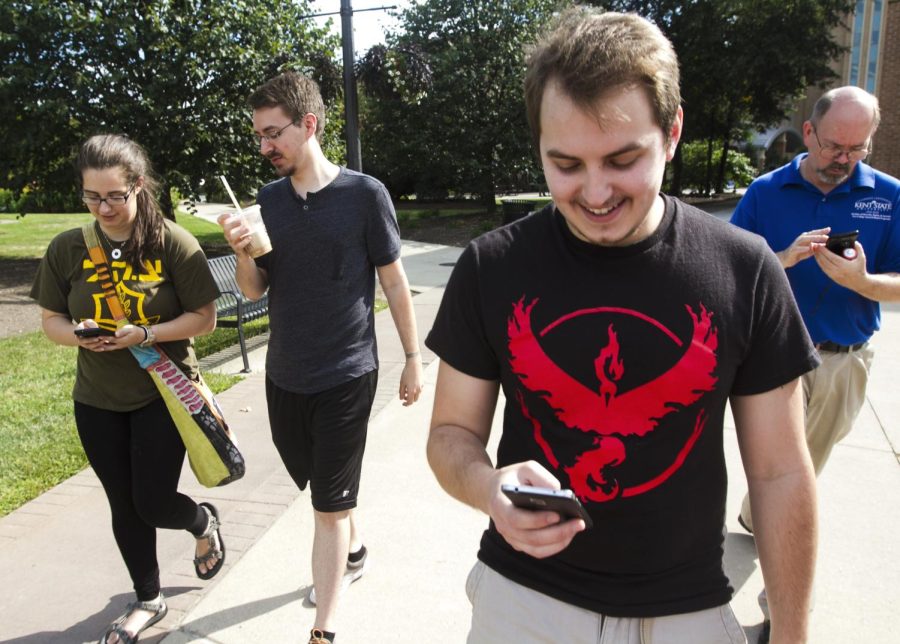KSU Pokemon League thrives off mobile game success
(From left to right) Senior fine arts major Melissa Mendelson, Kent State Pokemon League director of tournaments Patrick Brett, junior computer sciences major Max Eisenloeffel and Kent State employee Gaylen Moore tour the main campus playing “Pokemon Go” on Thursday, Aug. 25, 2016.
August 31, 2016
When Patrick Brett was asked if he was annoyed by the sudden popularity of Pokemon Go, he looked genuinely confused.
Brett doesn’t mind bandwagon fans; he’s just happy a game he’s always loved is finally getting the attention he feels it deserves.
The Cuyahoga Community College graduate has 20 years of Pokemon fandom under his belt, along with a championship in the Kent State Pokemon League, an organization he has been running for almost two years.
His knowledge and dedication to the game far surpasses the average bandwagon player.
“Why would I be mad? Why would anyone be mad?” Brett said. “The more people who like it, the merrier. As long as you’re a fan of Pokemon, that’s all that matters. It’s great to see everyone get along.”
The new interactive game by Niantic, which requires players to get up and walk to play, has renewed the interest in the Pokemon worldwide.
According to a report by SimilarWeb, “Pokemon Go” was at one point used more than Tinder and Twitter.
Brett and the rest of the the league had no reason to be upset. Relishing in the glory of Pokemon Go, the game brings an influx of new members interested in playing with some of the best Pokemon trainers in the region.
“Pokemon Go has taken the world by storm. People that didn’t even know what Pokemon is are now playing it,” said Corey Scott, president of the league. “It has changed the way we reach out to larger audiences as well.”
The club was created in 2014 by Harrisen Carney, a senior fine arts major at Kent State. Carney has religiously followed the media franchise since he was five years old.
Unapologetically passionate, Carney can always be found wearing his Dragon Tamer cape around campus, a gift bestowed to only top dragon trainers in the region.
The organization operated solely as a student club until 2015, when it became recognized as a league with Play! Pokemon, a division of the Pokemon Company that hosts the world championship trading card and video game tournaments.
When the club transitioned into a league, players did not have to be associated with Kent State to become members. The league became affiliated with Play! Pokemon instead of being affiliated as a student organization of Kent State.
Becoming a league also meant the organization could employ directors outside of the university, like Brett from Tri-C, to facilitate and manage the group as a professional cooperative.
Since its beginning, the league has had eight gym leaders, an ‘Elite Four’ and a champion, just like the video games. Three members have appeared in national tournaments.
“I wanted to see an organization where Pokemon is everywhere,” Carney said. “An organization that spreads the love (of) Pokemon to everyone, may it be for students or the entire community of Northern Ohio. In a way, it looks like Pokemon GO is another part of our organization.”
Upon the arrival of “Pokemon Go,” the league grew from 200 virtual members to almost 500 in several weeks, an unnatural spike for the organization. The league’s typical stagnant summer turned into a barrage of “Pokemon Go” adventures, where students, parents and even children joined members to trek across Kent State’s campus.
While it’s “too early to tell” to give definite numbers of membership, members of the league believe the university and downtown have characteristics that make playing “Pokemon Go” in Kent unique from other locations.
Andrew Vaughan, vice president of the league and a sophomore digital sciences major, said he hopes the app will “keep people coming back more frequently,” as their club has already exhibited growth.
“People that are playing here (on campus) are more abundant and friendly from what I’ve seen,” said Matt Eisenloeffel, a former Elite Four and senior political science major. “I see players walking around all the time, and most of them will stop to talk to you, or at the very least acknowledge you. A lot of other places I’ve noticed, people nod and carry on their own business if they see you playing.”
The area has more “rare” Pokemon, especially the Electabuzz, Magmar and Jynx, according to Brett.
Kent also has an unusually high amount of Pokestops, locations where players can acquire items such as pokeballs or healing potions, compared to other small cities in the region.
“Historical sites, such as the May 4 memorial and downtown Kent, are great locations to load up on items,” Brett said. “These landmarks are typically what Niantic Inc. chooses as Pokestops or gyms, and there are a ton here.”
Even if the future of “Pokemon Go” seems bleak – according to an article by Bloomberg, app usage is already in decline – the league still aspires to thrive off its original activities: trading cards and video games.
“The first goal of the league is to grow, (and) the second thing I’d like to do is for members to enjoy Pokemon and all that goes with that,” Scott said. “From the video game to the trading card game, (and) the anime and ‘Pokemon Go.’ This isn’t supposed to be hard. I want everyone to have fun while enjoying something they love.”
Contact Rachel Duthie at [email protected].












